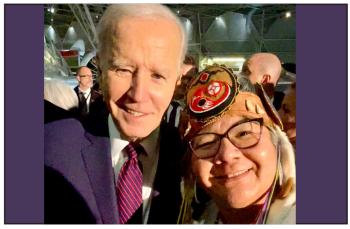Image Caption
Summary
Local Journalism Initiative Reporter
Windspeaker.com
It may only have been her “elevator pitch” but Assembly of First Nations (AFN) National Chief RoseAnne Archibald wasn’t going to pass up the opportunity to speak with United States President Joe Biden.
Archibald exchanged words with Biden in Ottawa after a formal dinner in the reception line last Friday, March 24, during his first visit to Canada since taking office.
“I call it my elevator pitch. I try and keep myself as succinct as possible when I know it’s not a long, long formal meeting,” said Archibald.
Her agenda was two action items: Missing and murdered Indigenous women and girls (MMIWG) and the Jay Treaty.
“It’s a national issue in the U.S. and I wanted (Biden) to know that we have this common threat, a common issue between the U.S. and Canada around missing and murdered Indigenous women and girls,” said Archibald.
In the U.S., she points out, Deb Haaland, secretary of the Interior, “has been working really hard on the issue” and is pushing for a formal inquiry. Canada wrapped up its national inquiry into MMIWG in 2019 with 231 Calls for Justice. Implementing those calls is slow moving but ongoing.
Archibald will continue to lend her voice and energy to the issue. In June, she has been invited by the National Congress of American Indians (NCAI) to attend a conference in Minnesota, which could lead to another audience with Biden in Washington.
“I certainly want to be respectful of the NCAI in helping facilitate that meeting with President Biden and Deb Haaland and others when we’re in Washington,” said Archibald.
On the home front, Archibald has given her full support to NDP Winnipeg-Centre MP Leah Gazan, who is calling for a Red Dress alert. Acting like an Amber Alert, it would be a notification for when Indigenous women and girls go missing.
“During the lead-up to the dinner with President Biden, I did have an opportunity to speak to a couple of senators… and there seems to be really a great deal of support for this idea from anyone I spoke to,” said Archibald.
She points to Washington State which in 2022 implemented an alert system for missing Indigenous peoples. Washington became the first state in the U.S. to do so, but more states have followed since, including California, Colorado and New Mexico.
This violence that impacts Indigenous women and girls occurs in both countries and is the result of colonization, says Archibald.
“All of Turtle Island has been settled in a way that’s extremely harmful to our women and girls, particularly from the onset of those settlers arriving. It’s not a new problem. It’s gotten to the point where we have to take concrete actions to make sure that our women and girls are safe and protected,” said Archibald.
As for the Jay Treaty, Archibald said she explained to Biden that problems exist with First Nations people trying to cross the border between the two countries.
The Jay Treaty of 1794 is supposed to allow First Nations people on both sides of the border to cross freely.
However, in 1952, the U.S. Congress limited that movement to persons “who possess at least 50 per centum of blood of the American Indian race.”
“We have had some issues of our people going back and forth (over) what we call the Medicine Line, the border. I just said that I would welcome an opportunity to talk to (Biden) about that more in depth,” said Archibald.
The reception line discussion was not what the AFN had been after when they learned of Biden’s impending visit to Ottawa. Archibald says they had made the request of the Prime Minister’s Office that a formal meeting be scheduled with Biden.
“We don’t know the details around why we weren’t able to get that done, but the dinner to me seemed like an opportunity. If there was an opportunity to just have a chat with him, I thought it would be definitely productive,” said Archibald.
Biden was in Canada for only 27 hours.
Last week marked the second time Archibald has met Biden. She shook his hand at the Queen’s funeral in September in London.
Never miss a Windspeaker article. Subscribe Today to our new Windspeaker Newsletter!
Local Journalism Initiative Reporters are supported by a financial contribution made by the Government of Canada

